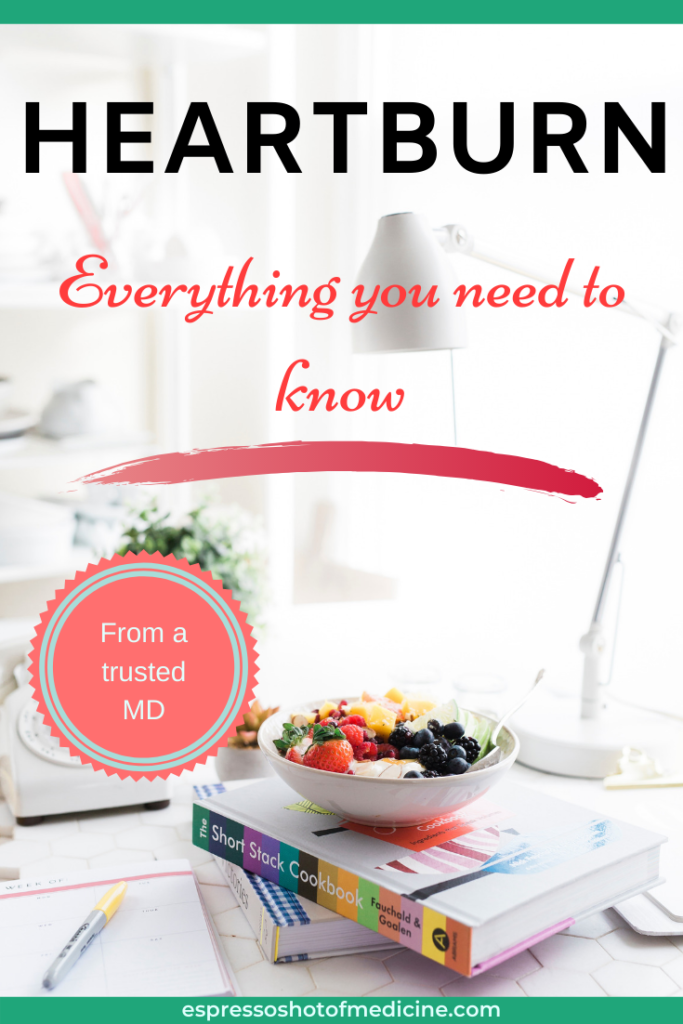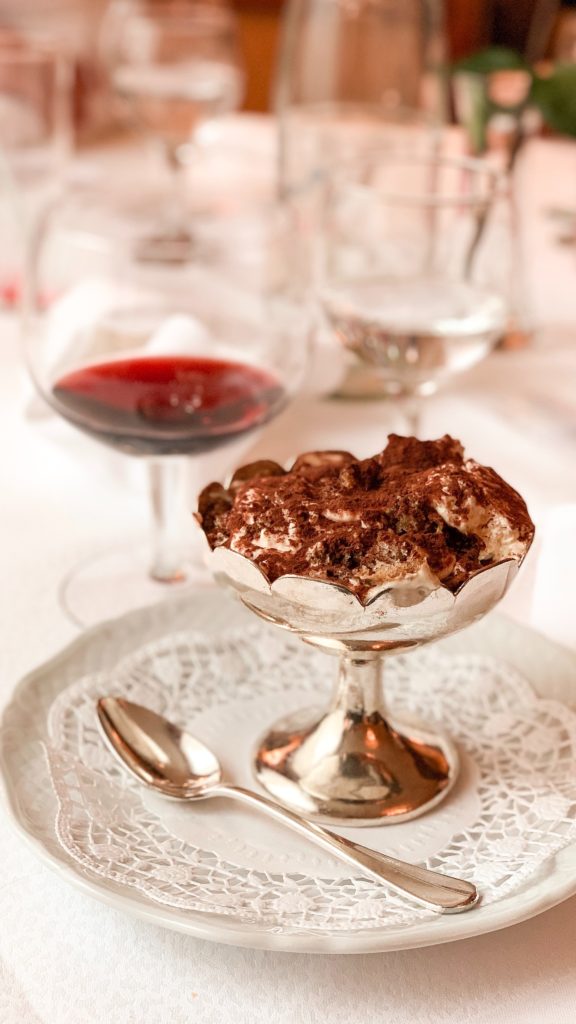A couple of days ago my partner and I went to a friends’ house for dinner. I always love going to Nick and Masa’s not just because of the great conversation and many laughs, but because they’re really great cooks! After one of the most delicious meals I’ve had in a long time, we were made our way to the living room for a well-deserved cup of coffee. I noticed Nick was constantly reaching for his stomach as if in pain. Knowing me for a long time, he recognized my worried look and smiled, saying, “It’s just a bit of heartburn Sonja. Nothing to worry about.” I smiled back taking a sip of my hot coffee, deciding to talk to him about it later.

Table of Contents
Heartburn – What is it?
Heartburn is a common complaint that affects a significant number of people.
However, what is it really and are people, including you perhaps, using the term heartburn for many different symptoms?
Simply put, heartburn, or pyrosis, is a burning pain that is felt in the upper abdomen below the ribs and can spread into the chest (Garriques, 2008).
The next question on your mind is probably, so what does it mean? To answer this question, you have to know that heartburn is a symptom of a few diseases rather than a disease itself. But I’m getting ahead of myself.
Related posts:
- Top 10 Kefir Health Benefits
- Top 6 Science-Backed Ways Reading Improves Brain Function
- Burnout Prevention Journal for the Busy Professional
Causes of Heartburn
Let’s start with what cases this burning pain. Normally what happens when we eat is that food travels down our esophagus, passes the sphincter (like a little gate) to the stomach and enters the stomach where acid in the stomach continues processing the food.
What happens with heartburn is that acid from the stomach travels up into the esophagus and irritates it. There are a few reasons this backwards flow could happen:
- Gastroesophageal Reflux Disease (GERD)
- Non-ulcer Dyspepsia (NUD)
- Peptic Ulcer Disease (PUD)
- Gastritis
At this point you may be thinking, “Okay great, I know what could be causing it, so let me get back to watching Game of Thrones.” While this does sound super enjoyable, (I’m a huge fan too!) read on a little bit more and you’ll be glad you did!

Gastroesophageal Reflux Disease (GERD)
GERD occurs because the sphincter that is supposed to prevent acid from coming up into the esophagus relaxes and closes at inappropriate moments (Garriques, 2008). It’s supposed to open of course for food to enter the stomach, but then it is supposed to stay closed until the next bout of food comes along. If it opens at any other moment, acid will enter the esophagus.
Compared to the other causes of heartburn I’ve mentioned above, you may be more likely to have GERD if you’ve noticed your heartburn gets worse with (Lopez-Colombo, 2017) :
- Eating chocolate
- Eating peppermint
- After drinking coffee
- After drinking alcohol
- Lying down especially after a meal
In addition you may notice a strange metallic taste in your mouth.

The Problem With GERD
Besides that GERD may be causing you discomfort and pain, the problem is that it actually increases your chances of developing cancer. You see, acid isn’t supposed to be in your esophagus. Usually the sphincter prevents this.
Thus, the cells that line the esophagus cannot handle acid. But you see, your body is pretty great that it can adapt to a lot of things. So your cells in the esophagus will start to change to a type of cell that can handle this new acid. Pretty neat, eh? This is called metaplasia.
When your esophagus makes these metaplasic changes, this is called Barrett Esophagus (Shaheen, 2009). The problem is that these cells can continue to change and can progress to pre-cancer (dysplasia).
Although it will take about 5-10 years of GERD for Barrett Esophagus to develop, remember that that’s 5-10 years of painful and annoying heartburn after delicious meals.

Gastritis
On the other hand, GERD may not be causing your heartburn at all. Another cause of this pain is something called gastritis. It can cause very similar pain GERD and thus can confuse. Gastritis is an inflamed or eroding stomach.
If you’re experiencing any of the following, you may have gastritis:
- Pain under your ribs in the middle of your abdomen (epigastric)
- Consume alcohol in larger amounts (come now, you know what larger amounts is) and often
- If you take NSAIDS (ibuprofen for example) often
If having your stomach inflamed and eroding isn’t enough to get you picking up the phone to book a doctor’s appointment, know that with gastritis you’re at risk of having your stomach bleed.
Peptic Ulcer Disease (PUD)
As I’ve said, the use of NSAIDS can cause gastritis, but it can also case PUD (Griffin, 1991). These are gastric (stomach) and duodenal (first part of the small intestine) ulcers. And just like in gastritis and GERD, these ulcers can cause that same epigastric pain that you identify as heartburn.
If you notice that your pain gets worse after eating, you may have a gastric ulcer. However, if you see that the pain gets better after eating, to only get worse 2-3 hours later, this may be a duodenal ulcer.
The problems with ulcers are a few. Ulcers can bleed or perforate (create a hole in your stomach or duodenum) (Malfertheiner, 2009).
More than this, existing gastric cancer or gastrinoma (special kind of tumour that causes increased acid production in the stomach) could actually be causing these ulcers (Wolfe, 1987). In this case. these ulcers are actually a sign of a bigger problem. Although ulcers can be caused by cancer, gastric ulcers can themselves be associated with the development of gastric cancer (Wu, 2009).
Gastritis, PUD, and Helicobacter pylori
Any story of gastritis or peptic ulcer disease is incomplete without talking about Helicobacter pylori. Helicobacter pylori is a bacteria identified in the 1980’s. More than 50% of people have H. pylori in their upper gastrointestinal tract (Amieva, 2016). However, most of these people will never have symptoms (Bytzer, 2011). For other people, H. pylori will cause gastritis or a gastric or duodenal ulcer (Take, 2005).
When your doctor works on diagnosing gastritis or PUD, they will also test to see if you are infected with H. pylori. This is done because even if you are treated for gastritis or PUD, if you are infected with H. pylori and don’t treat it, your gastritis or ulcer will keep on coming back. Therefore, it is important to treat and eradicate H. pylori if you test positive for it. This way, you prevent re-occurrence of gastritis or peptic ulcers.

Non-ulcer Dyspepsia (NUD)
The last condition I want to mention that would be causing that pesky heartburn is Non-ulcer dyspepsia (NUD). NUD gives you that heartburn feeling, but there is no known cause for it. Simply put, we just don’t know yet why it happens. Does that mean we can’t do anything about your heartburn then? You just have to live with it? No! You can also treat it!
Recap
So let’s do a quick recap. What are all the conditions that can cause heartburn pain?
- GERD
- Gastritis
- Gastric cancer
- Peptic Ulcer Disease
- Non-ulcer Dyspepsia.
We’ve gone through some of the complications from these such as bleeding, cancer, and perforation. Going back to our friends, Nick and Masa from the beginning of the article, what would you tell Nick? Is it just a bit of heartburn? Should he just ignore it?
I hope I’ve done my job well and you’re saying, “Tell him to go to the doctor already!”
The Point
My point with this article is not to scare you. It’s to show that simple, seemingly just annoying problems like heartburn, can be signs of other disorders that have already developed or have yet to develop.
Although it’s tempting to ignore problems hoping they’ll just go away by themselves, I think we’ve all experienced the tough truth that this rarely happens. (Unless it’s your turn to cook dinner and your partner surprises you with take-out pizza. Oh the joy!) What you should keep in mind is that if treated on time, none of these are such big problems. Also, the sooner the treatment is taken, the less likely there are to be any complications. If for no other reason, the sooner you head over to the doctor’s office, the sooner that heartburn pain goes away.

What Happened to Nick?
To put your mind at ease, I did talk to Nick later in the evening about going to the doctor’s. A few days later I received a very happy email from Nick. He told me he had been to the doctor, was diagnosed with GERD and is now on medication that has gotten rid of his heartburn. I hope you’ll do yourself the same favour, head over to the doctor’s, put your mind at ease of complications and get rid of that pain!
Questions?
If you have any more questions, feel free to contact me! Or if there is a topic you are dying to know more about, give me a shoutout through one of the social media options on the side or leave a comment below!
Definitely let me know how your journey is going! I love hearing from you!
Lastly, make sure to sign up to my newsletter to get the latest medical easy-to-understand information on all your questions!
Have a wonderful week everyone!




Hi!
Barrett’s esopgagus is NOT a form of cancer. Please change as those affected might be shocked by reading this. Also, cancer risk of Barrett’s is actually much lower than people used to think.
Hi Anne Rose! Thank you for catching the mistake! I’ve corrected it.
Barrett Esophagus is metaplasia that may progress to dyplasia and that then may progress to adenocarcinoma, but it may not as well.
Thank you for taking the time to read and comment!